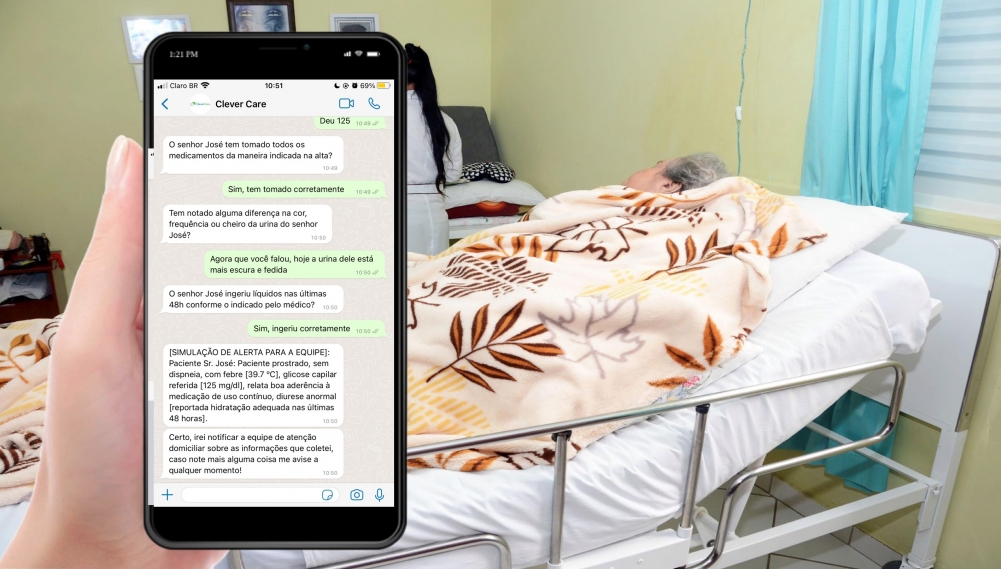

The tool is very versatile and allows the creation of specific journeys according to the needs of each user (image: Kidopi)
System developed by FAPESP-supported startup provides information and guidance after hospital discharge.
System developed by FAPESP-supported startup provides information and guidance after hospital discharge.

The tool is very versatile and allows the creation of specific journeys according to the needs of each user (image: Kidopi)
By Roseli Andrion | Agência FAPESP – For some years now, it has been recognized that the best environment for a patient’s recovery is their own home. On the other hand, there is a risk that they won’t know if they are doing well – not least because they don’t have the intensive care offered in a hospital – and will feel the need to stay in the care unit.
To reduce these risks, the co-founders of Kidopi, a startup based in Ribeirão Preto (São Paulo state, Brazil), thought when they developed a digital companion, available on WhatsApp, that provides information and guidance while acting as a guardian. The solution was created with the support of FAPESP’s Innovative Research in Small Businesses Program (PIPE).
The startup’s co-founder and CEO, Mario Sérgio Adolfi Junior, says that the idea was to provide an accessible and easy-to-use tool for patients. “We chose WhatsApp because it’s a widely used platform, it’s familiar to patients, and it doesn’t require any downloads or complicated interfaces.”
According to Adolfi Junior, the tool is very versatile and allows the creation of specific journeys according to the needs of each user. “I realized that the big challenge is that patients don’t have enough follow-up after leaving the hospital. They often don’t know if they have any serious symptoms and the result is repeated visits to the health unit,” he states.
For example, after surgery, Kidopi’s system can monitor the patient to find out how they are recovering and remind them to take their medication. “If anything goes wrong, the patient is told to go to the hospital. It’s as if we’re holding their hand and guiding them all the way.”
All of this conversation takes place fluidly over WhatsApp, as the system uses natural language processing – allowing the user to interact as if they were in contact with a healthcare professional. “Because the user is talking on WhatsApp, an app they’re used to, adherence is high. They talk the way they’re used to, and the system understands and guides them through the process.”
Adolfi Junior says that of the users who were told to stay home, 100% had no problems. “Of those who went to the hospital, 75% should have gone there. These were cases where there was a serious point and intervention was needed,” he says. “In a project we did in partnership with the A.C.Camargo hospital and Johnson & Johnson, because the patients went to the health unit early, there was a 67% reduction in surgical complications.”
If the user is told to go to the health unit, the entire history of their conversation with the system is sent to the doctor who will see them. “It’s all interconnected. Everything goes to a hospital switchboard, which gets an alert that the patient is on their way, as well as information about what happened. If necessary, a health professional can contact them for more information.”
The service is always free to the patient – the cost is borne by the healthcare provider, such as a hospital, pharmaceutical company or health plan. This improves adherence and democratizes access to care.
The versatility of the solution allows it to be used in other situations in addition to monitoring patients after surgery. Kidopi has programs for diabetes, cancer, osteoporosis and other chronic conditions. It also monitors the elderly and those seeking well-being, such as weight loss. “We monitor the elderly to ensure a better quality of life and prevent complications. It’s a comprehensive approach that takes into account the mental and emotional health of the caregivers,” he explains.
On the road to internationalization
Today, Kidopi’s solution is already in the hands of thousands of patients. “FAPESP was essential for us to be able to turn an academic project into a company,” says Adolfi Junior.
The company is now preparing to expand internationally, with a new PIPE project to develop Spanish and English versions of the solution. “We’re happy to have opened our company in the state of São Paulo and to have the support to make our technology globally competitive.”
The startup was one of those selected to participate in a business mission during FAPESP Week Spain, which took place from November 27 to 28 at the Faculty of Medicine of the Complutense University of Madrid (UCM) in the Spanish capital.
The researcher believes that digital medicine has great potential, especially for patients who require constant care, such as the elderly. “The world is aging rapidly, and solutions like ours will be essential to ensure that the elderly can receive continuous, high-quality care without having to be constantly hospitalized.” While the digital solution doesn’t replace the doctor or specialized care, it can complement and support them by providing a safety net for the patient.
Republish
The Agency FAPESP licenses news via Creative Commons (CC-BY-NC-ND) so that they can be republished free of charge and in a simple way by other digital or printed vehicles. Agência FAPESP must be credited as the source of the content being republished and the name of the reporter (if any) must be attributed. Using the HMTL button below allows compliance with these rules, detailed in Digital Republishing Policy FAPESP.





